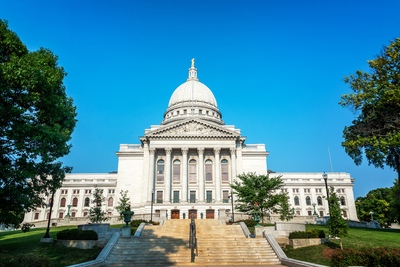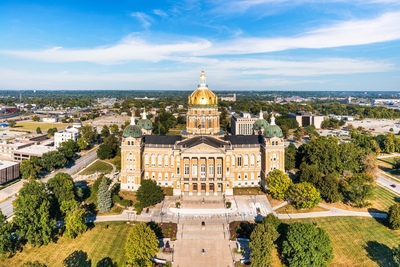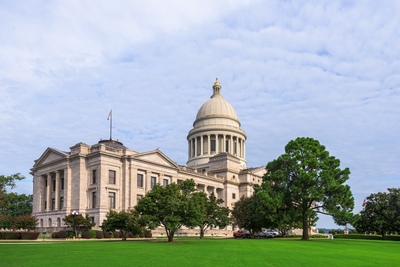
Elections & Campaigns
2026 State Elections Could Reshape Trifecta Control (States to Watch)
February 5, 2026 | Bill Kramer
Much of the national attention on election night was focused on the U.S. House, where Democrats reclaimed control after eight years of Republican rule. However, Democrats also made significant gains at the state level, taking control of seven governor seats previously held by Republicans. Following the elections, there will be 26 Republican governors and 23 Democratic governors, pending the outcome in Georgia.
.png)
Illinois Governor Bruce Rauner faced some of the worst approval ratings in the country, making it easy for Democrat J.B. Pritzker to win a convincing victory with 54 percent of the vote. Pritzker used a massive war chest, spending $171 million of his own money to win the race. The billionaire heir to the Hyatt Hotel chain will have a party trifecta with Democratic control of both legislative chambers but will face $130 billion in unfunded liabilities for the state’s beleaguered pension plan.
Kansas had perhaps the biggest surprise of the night for Democrats, with state Senator Laura Kelly defeating Secretary of State Kris Kobach with 47 percent of the vote. Kobach drew a national spotlight for his aggressive stance on voter fraud and illegal immigration, but Kelly successfully tied Kobach to the unpopular administration of former Governor Sam Brownback. Kelly has vowed to increase funding to schools and expand Medicaid. Independent candidate Orman looked like a potential spoiler in a tight race, but after polling around ten percent, he received just six percent of the vote.
Maine may finally have voter-approved Medicaid expansion with the election of Democrat Janet Mills. Former Governor Paul LePage (R) has resisted implementing the measure voters passed in 2017, but Mills vows to expand the program. The former state attorney general took 51 percent of the vote against Republican businessman Shawn Moody and received a boost when an independent candidate dropped out and endorsed her a week before the election.
Michigan will no longer have a trifecta of Republican control, with Democrat Gretchen Whitmer winning the gubernatorial race with 52 percent of the vote. The former Michigan Senate Minority Leader has vowed to improve road infrastructure, fund schools, and introduce a universal pre-K program. Republican nominee Bill Schuette was criticized for his handling of the Flint water crisis as attorney general and struggled to unite the party after a divisive primary in which he could not get the endorsement of sitting Republican Governor Rick Snyder.
Nevada elected its first Democratic governor in 20 years, choosing Clark County Commissioner Steve Sisolak in a close race over Attorney General Adam Laxalt. Sisolak took 49 percent of the vote and will enjoy a party trifecta with Democrats holding onto both legislative chambers. Both candidates tried to tie themselves to popular outgoing Governor Brian Sandoval, although Laxalt could not get the endorsement from his fellow Republican. Sisolak ran on education reform, calling for diverting more tax revenues from the hotel room tax to schools and legalizing marijuana to increase funding for schools and reduce class sizes.
New Mexico voters had to choose between two sitting U.S. Representatives, electing Democrat Michelle Lujan Grisham over Republican Steve Pearce. Lujan Grisham enjoyed a double-digit victory, securing 56 percent of the vote. She has vowed to sign into law many bills vetoed by outgoing Republican Governor Susana Martinez and will push to raise the minimum wage and fund early childhood programs.
Wisconsin voters will not give a third term to Republican Governor Scott Walker, as he lost in a close race by just over one percentage point to Democrat Tony Evers. The Superintendent of Public Instruction won a crowded Democratic primary and took advantage of sagging approval ratings for Walker. Evers promises to strengthen the Affordable Care Act, including ending a suit against the law, expanding Medicaid, and setting up a “public option.” He also wants to work with Republicans on improving the state roads and would consider increasing the gas tax and implementing road tolls to accomplish that goal.
Alaska had a three-way race until sitting independent Governor Bill Walker abruptly ended his re-election campaign just weeks before the election. He endorsed Democratic nominee Mark Begich, a former U.S. Senator, but Republican Mike Dunleavy maintained his lead in the polls and won with about 45 percent of the vote. The Permanent Dividend Fund, a payout to Alaskans from oil revenues, was a major issue in the campaign, with Dunleavy vowing to restore the statutory formula in determining the size of the payment, a formula that Walker had departed from.
Georgia had one of the most visible gubernatorial races with President Donald Trump and Vice President Mike Pence flying in for rallies for Republican candidate Brian Kemp and celebrities Oprah Winfrey and Will Ferrell stumping for Democratic candidate Stacey Abrams. Democrats were hoping to flip a seat that had been unattainable for them for years. Kemp has just over 50 percent of the vote with nearly all precincts counted, but there remain thousands of absentee and provisional ballots yet to be counted. Georgia law requires the top candidate to get over 50 percent of the vote to avoid a run-off election and Abrams has yet to concede.
Florida offered one of the biggest contrasts between candidates, but Republican Ron DeSantis prevailed in a very close race against Democrat Andrew Gillum. In Ohio, Republican Mike DeWine defeated Democrat Richard Cordray for the second time, having defeated him before in the attorney general race in 2010. Oklahoma businessman Kevin Stitt faced a close race in the polls but walked away with a double-digit victory over Democrat Drew Edmondson. South Dakota polls also showed a close race, but U.S. Representative Kristi Noem took 51 percent of the vote to defeat Democratic state lawmaker Billie Sutton.
Alabama Governor Kay Ivey won her first full term with 59 percent of the vote after taking over the seat when former Governor Robert Bentley resigned. Arizona Governor Doug Ducey faced some backlash over school funding earlier this year, but he still easily won re-election over David Garcia. Arkansas Governor Asa Hutchinson easily won re-election, claiming nearly two-thirds of the vote. Idaho Lieutenant Governor Brad Little easily defeated Paulette Jordan, who was hoping to become the first Native American governor in the country. Iowa Governor Kim Reynolds trailed in most polls but was able to get 50 percent of the vote to defeat Democrat Fred Hubbell. Popular Republican governors in blue states like Charlie Baker in Massachusetts, Larry Hogan in Maryland, and Phil Scott in Vermont all cruised to victory as well on Tuesday.
Nebraska Governor Pete Ricketts, South Carolina Governor Henry McMaster, and Texas Governor Greg Abbott all easily won re-election. New Hampshire Governor Chris Sununu faced a tougher race, but high approval ratings fueled him to victory with 52 percent of the vote. Tennessee voters elected Bill Lee and Wyoming voters elected state Treasurer Mark Gordon.
Colorado has elected the first openly gay male governor in the country, choosing former U.S. Representative Jared Polis over state Treasurer Walker Stapleton. Connecticut voters had high dissatisfaction with outgoing Democratic Governor Dannel Malloy, but Ned Lamont fended off a strong challenge from Republican businessman Bob Stefanowski to keep the seat blue. Minnesota voters elected a Democratic governor, Tim Walz, as well as giving Democrats control of the state House.
Oregon Governor Kate Brown was down in some polls to state lawmaker Knute Buehler but won her first full term with 49 percent of the vote. Gavin Newsom easily won over Republican businessman John Cox in California. Hawaii Governor David Ige, New York Governor Andrew Cuomo, and Pennsylvania Governor Tom Wolf, and Rhode Island Governor Gina Raimondo all cruised to re-election wins.
.png)

February 5, 2026 | Bill Kramer

February 4, 2026 | Maggie Mick

January 23, 2026 | Andrew Jones